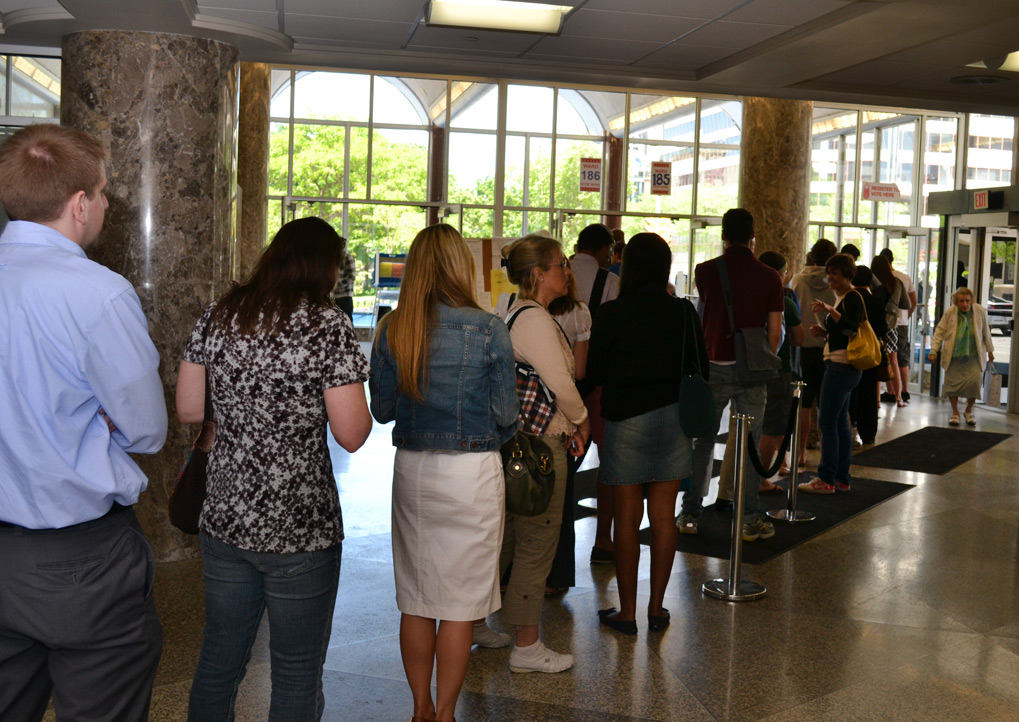Wisconsin’s Real Voting Problems
Reports by Common Cause and League of Women Voters spotlight two ways democracy denied.
Two recent reports, one from the League of Women Voters of Wisconsin and one from Common Cause in Wisconsin, shed light on Wisconsin’s voting problems. And the problems do not include people impersonating other people in order to vote illegally — the problem that is supposedly addressed by Wisconsin’s photo ID law. In fact, impersonating someone else in order to vote is already illegal; it is a felony, which is probably why so few people attempt it.
The League of Women Voters’ report was compiled based on placing 103 trained volunteers in 202 polling places to observe a range of problems in voting related to the April 5, 2016, election. For most voters everything went smoothly, with observers reporting that “poll workers were professional, helpful and respectful of voters.”
There were, however, enough problems reported to raise significant concerns about the integrity of the voting process in the state.
There were problems reported that poll workers in some locations did not know the rules associated with all the recent changes in voting laws. For example, voting officials incorrectly told potential voters that the address on the photo ID (e.g., a driver’s license) had to be the same as their current address.
The report from Common Cause in Wisconsin may be even more disturbing.
Common Cause says that due to gerrymandering, only one in 10 legislative races for state Assembly and state Senate is competitive (defined as within 10 percentage points, e.g., 55 percent to 45 percent or closer). In the November 2016 election this means that only 12 out of 115 Assembly and Senate seats meet the 10-point definition of competitive. Before redistricting (gerrymandering) took place in 2011, 23 percent of Assembly and Senate races were competitive in the 2010 election.
Through the gerrymandering process, legislators create district maps that make majority party seats “safe” and deprive voters of any real choice in 90 percent of state elections. Common Cause’s solution: Adopt Iowa’s nonpartisan plan for developing fair voting maps.
The argument most espoused for the photo ID law is that we need to prevent voter fraud, even though there is almost no evidence of it. If even one person votes illegally, it affects the integrity of the whole process for all legal voters.
Conversely, the same argument applies: If even one legal voter is kept from voting, it has the exact same affect. Based on extensive anecdotal evidence and the league report, it is clear that way more than one legal voter has been denied the right to vote and we need to fix the problem. The solutions seem relatively simple — adopt the Iowa plan for redistricting, and allow voters who lack the required photo ID or other requirements, such as proof of residence, to sign an affidavit swearing or affirming that they are who they say they are and are eligible to vote.
I remember when we were proud of high voter turnouts and clean elections in Wisconsin. We must return to those days and make it even better by guaranteeing, not that we prevent one illegal voter, but that we assist all eligible voters in exercising their constitutional right.
Tom Frazier is a member of the Common Cause in Wisconsin State Governing Board, and was the executive director of the Coalition of Wisconsin Aging Groups from 1983 to 2010.
This column was originally published by Madison’s Cap Times.
Op-Ed
-
Wisconsin Candidates Decry Money in Politics, Plan to Raise Tons of It
 Dec 15th, 2025 by Ruth Conniff
Dec 15th, 2025 by Ruth Conniff
-
Trump Left Contraceptives to Rot; Women Pay the Price
 Dec 8th, 2025 by Dr. Shefaali Sharma
Dec 8th, 2025 by Dr. Shefaali Sharma
-
Why the Common Council’s Amended Budget is Good Policy for Milwaukee
 Nov 20th, 2025 by Alds. Marina Dimitrijevic and Russell W. Stamper, II
Nov 20th, 2025 by Alds. Marina Dimitrijevic and Russell W. Stamper, II






















Regarding the Gerrymandering, while it’s pretty bad, if you compare it nationally, we’re about halfway through the GOP gerrymanders.
http://autoredistrict.org/all50/version3/CD_PRES/country_pie_sorted_select.php?source=CD_2010
About 25 – half of the states – have a pro-GOP gerrymander. Only about 5 favor dems, and only slightly so, at that. The only one that looks deliberate is Maryland. Indeed I’m pretty sue most of the others were drawn by GOP.
This harks back to the point of “so both sides do it?” (I’m trying to bring the word “hark” back in to the vernacular. Wish me luck.) Yes, I suppose Maryland serves as a legitimate example that not all of the 26 gerrymanders are by the GOP. Thanks for that, Governer O’Malley. (Yes, THAT O’Malley!)